Key takeaways:
- Reparations politics is linked to historical injustices, emphasizing the need for a broader understanding beyond financial compensation to address generational trauma and systemic barriers.
- The current debates reveal a range of opinions on reparations, highlighting the challenges of defining eligibility and the impact of economic implications on wealth inequality.
- Community perspectives emphasize the importance of inclusive dialogues and holistic approaches to reparative justice, addressing not only financial aspects but also issues in education, healthcare, and housing.
- Future discussions on reparations may inspire systemic changes and greater civic engagement, encouraging holistic reparations that reshape societal norms and educational reforms.

Understanding reparations politics
Reparations politics is a complex landscape shaped by historical injustices, primarily slavery and systemic racism. Reflecting on my own experiences, I recall discussions in my community about the lingering effects of these injustices. Have you ever considered how past wrongs influence current socio-economic disparities?
In contemporary discourse, advocates argue that reparations are essential for acknowledging and addressing these deep-rooted issues. I remember a poignant community gathering where someone shared their family’s story of loss and struggle, highlighting how generational trauma impacts their life today. This persistent thread of history makes it clear that reparations are not merely financial; they represent a necessary step towards healing and justice.
Understanding the nuances of reparations politics requires us to confront uncomfortable truths. When I hear voices both in favor and against reparations, I often wonder: what does true accountability look like? Engaging with these diverse opinions enriches our conversation and pushes us toward a more inclusive approach to justice for all.
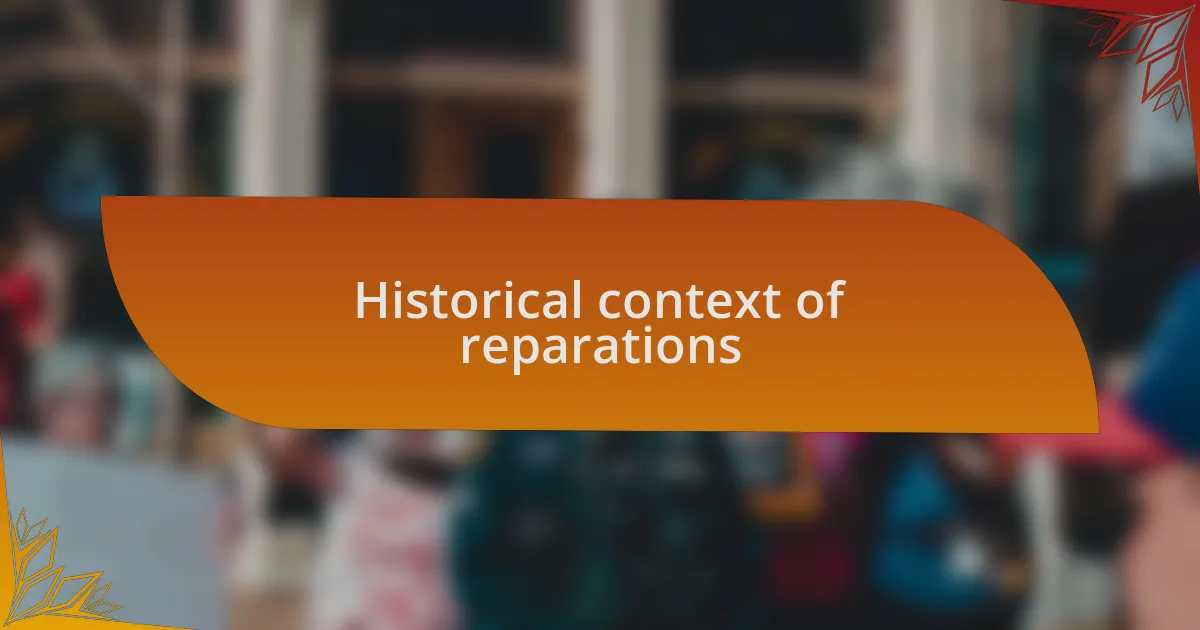
Historical context of reparations
The historical roots of reparations can be traced back to the aftermath of slavery, where promises made, like the famous “forty acres and a mule,” went unfulfilled. Reflecting on this, I often think about how those unkept promises continue to resonate in today’s conversations about equity. Why is it that the descendants of those who suffered still face systemic barriers, even generations later?
During the Reconstruction era, there was a brief hope for reparative measures, but political resistance ultimately stalled meaningful progress. I remember discussing with a friend how painful it is to realize that many communities have been waiting for justice for over a century. Can we genuinely move forward if we don’t reckon with the past?
In recent years, calls for reparations have gained momentum, fueled by a growing acknowledgment of historical injustices. I often find myself pondering how differing perceptions of history shape our present-day views on reparations. What might the healing look like if we embraced a shared understanding of this painful legacy?
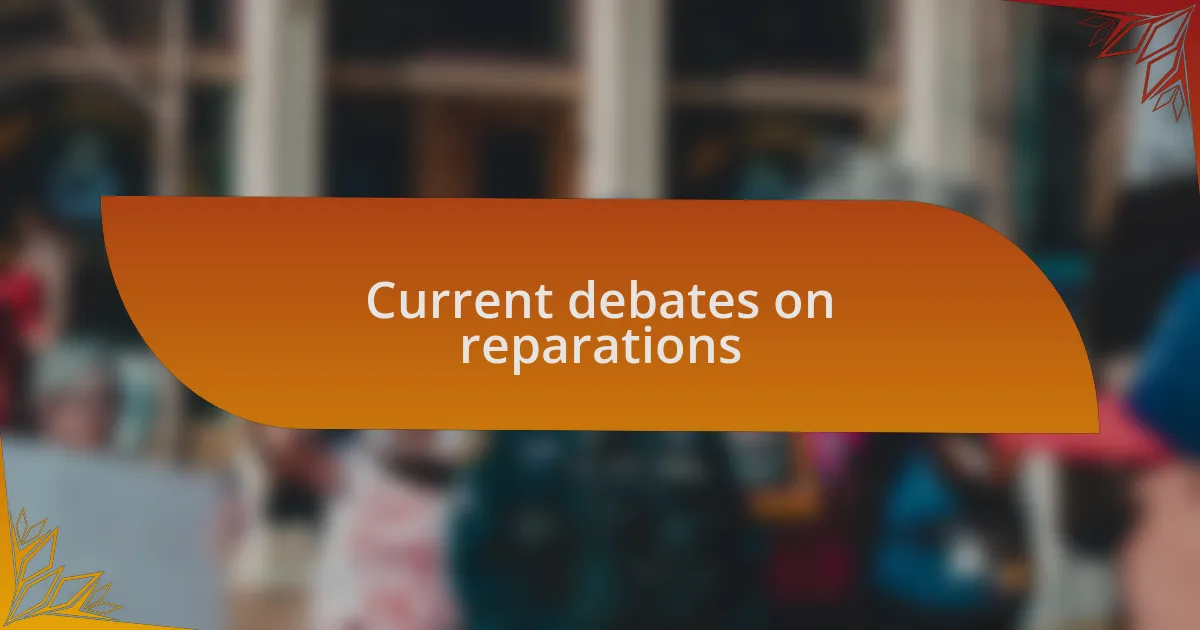
Current debates on reparations
The current debates on reparations are both intense and multifaceted. I often find myself in discussions where people express passionate opinions—some strongly support reparations as a necessary step towards justice, while others argue against them as impractical or divisive. It raises a question I frequently ponder: What would true restitution look like when trust among communities still feels fractured?
Another aspect of the conversations surrounding reparations centers around who should be compensated. I recall attending a town hall meeting where community members grappled with defining eligibility. It made me realize how deeply personal the issue is—each story reflects a unique connection to history and trauma. Why does it seem so daunting to create a framework that honors those individual experiences while also making it fair?
Moreover, economic implications frequently dominate these discussions. A friend recently shared data showing the potential impact of reparations on wealth inequality, sparking an insightful debate about the responsibility of current generations to address past wrongs. It left me wondering if genuine reparative actions could actually lead to a stronger, more equitable society, or if the climb towards such progress remains insurmountable.
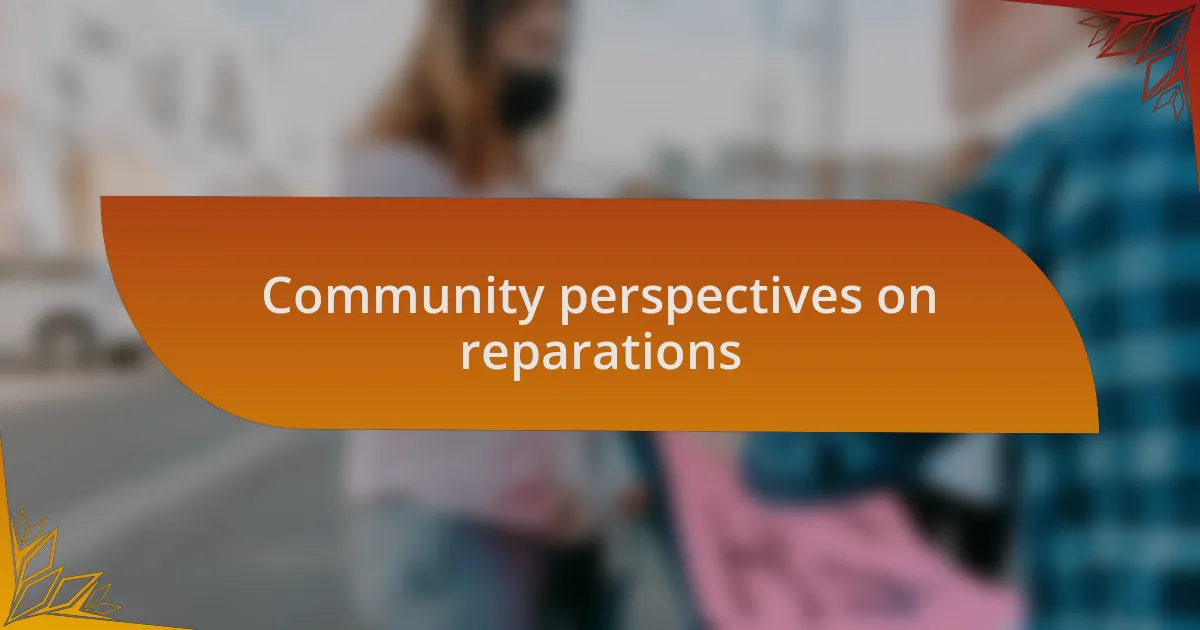
Community perspectives on reparations
Community perspectives on reparations often reveal a spectrum of emotions. I remember speaking with a neighbor, a descendant of enslaved people, who expressed a mix of hope and skepticism. She articulated that while reparations could be a recognition of historical wrongs, the complexities of implementation left her feeling uncertain. Isn’t it ironic that something meant to heal can also stir such apprehension?
In another conversation, a local activist emphasized the importance of inclusive dialogues. She noted that many in the community feel overlooked when discussions about reparations take place. It struck me how crucial it is to bring everyone’s voices to the table. If we believe that reparations are about justice, shouldn’t we ensure that all affected perspectives inform the solutions we seek?
Different communities also experience reparations through varying lenses. For instance, some see it as a chance for economic support, while others view it as an opportunity to address systemic injustices beyond financial recompense. Having facilitated several workshops, I discovered that many people want to explore holistic reparative justice—addressing education, healthcare, and housing inequities too. Why limit the conversation to just one aspect when the ramifications of historical injustices are so wide-ranging?
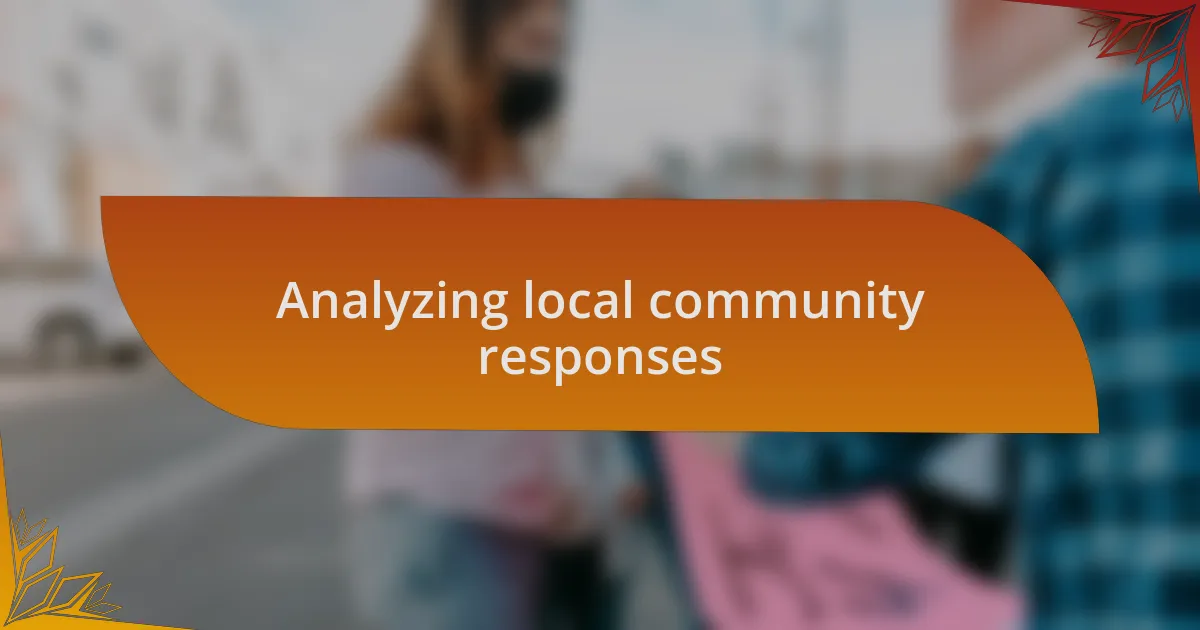
Analyzing local community responses
Local community responses to reparations vary significantly, often shaped by personal experiences and collective histories. I remember attending a town hall meeting where an elder shared her family’s story of generational trauma related to systemic racism. This heartfelt sharing not only moved many in the room but also sparked a discussion about what reparations could genuinely mean for healing. It left me wondering, can financial compensation truly address such deep-rooted pain?
In another instance, a local business owner expressed frustration with the sometimes narrow focus on reparations as merely monetary support. He passionately advocated for investments in local businesses and education, arguing that reparations should empower communities rather than simply offer checks that could be gone in an instant. I found his perspective thought-provoking: shouldn’t we think about reparations as a broader community investment that fosters long-term change?
The conversations I’ve had underscore a critical point: many recognize that reparations must encompass both recognition of past injustices and a structured pathway forward. During a recent community forum, someone posed a question that resonated with me: “What legacy do we want to leave for future generations?” This speaks volumes about our collective aspirations; we seek reparations not just as a form of acknowledgment but as a foundation for building a more equitable future together.
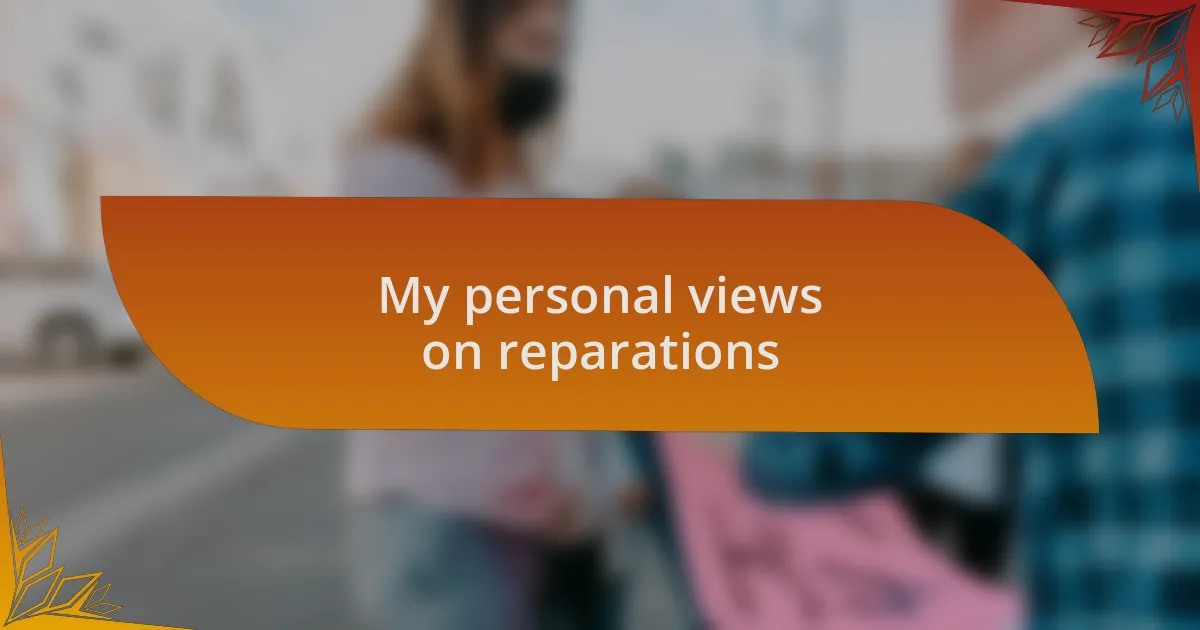
My personal views on reparations
When I reflect on reparations, I often think about the meaning of justice and healing. In conversations with friends, I’ve shared that financial compensation alone feels hollow without a genuine acknowledgment of the pain endured by marginalized communities. I vividly recall a discussion with a close friend who shared her family’s struggle against systemic barriers; it made me realize that reparations must include a deeper recognition of our shared history, rather than just a transactional solution.
One day, while volunteering at a local nonprofit, we engaged in a discussion about what reparations could look like in practice. I was struck by a young participant who suggested that reparations should also involve creating spaces for dialogue and education. This opened my eyes to the possibility that reparations can serve not just as a remedy for historical wrongs, but also as a tool for fostering understanding among different communities. Is it possible that by learning and sharing stories, we can forge stronger connections and pave the way for collective healing?
In my experience, discussing reparations often evokes a mixture of hope and skepticism. I remember attending a gathering where someone questioned if reparations would truly change systemic issues. It struck me deeply, as it highlighted the urgency for strategies that result in tangible community empowerment. Ultimately, I believe that our journey towards reparations is not just about redressing the past but envisioning a future in which equality and opportunity are accessible to all.
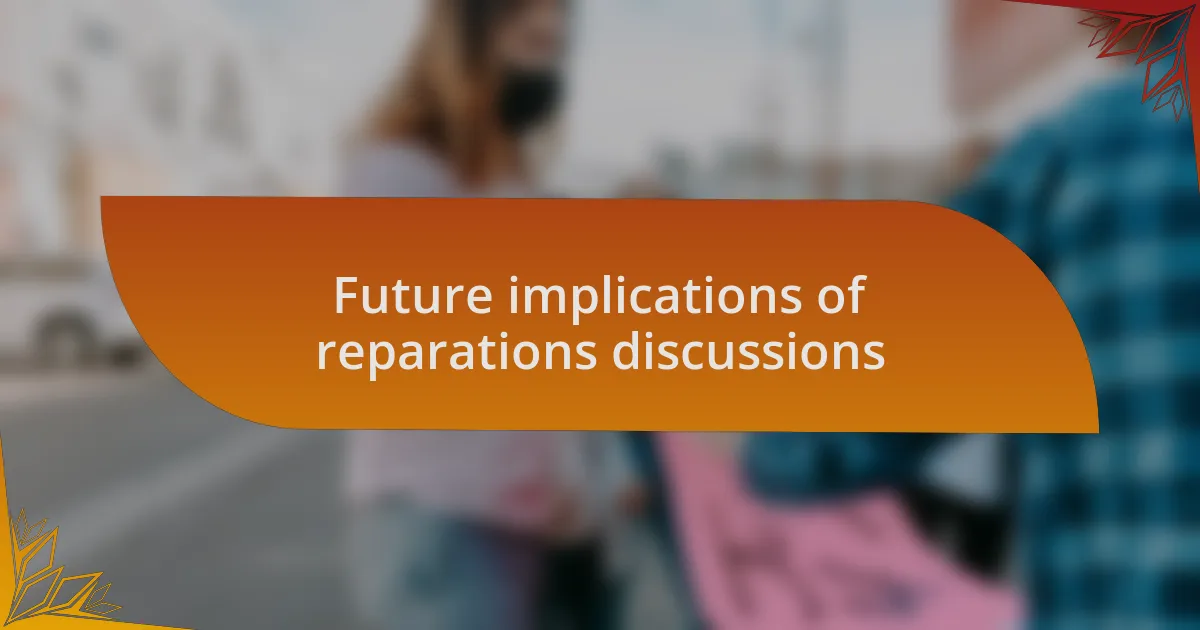
Future implications of reparations discussions
The discussions around reparations have the potential to reshape societal norms and expectations. I recall a moment during a community forum where an elder passionately spoke about the legacy of injustice. It reminded me that these conversations can ignite movements, encouraging communities to demand not just financial reparations but also systemic changes in policy and representation. It raises the question: how will this demand for holistic reparations influence other social justice movements?
In my observations, reparations discussions instill a sense of urgency for change. I remember a local activist expressing concern about the younger generation growing disillusioned with political processes. This sentiment underscored for me that litigation on reparations might lead to renewed civic engagement and a commitment to collective action. Could it be that the push for reparations will encourage more robust participation in local governance and activism?
Furthermore, the implications extend beyond immediate financial reparations; they may lead to a cultural shift in how we address historical grievances. I think back to a workshop I attended, where participants brainstormed ways to integrate these discussions into local education systems. This insight resonated deeply with me, as it signifies the possibility of fostering a new generation that values equity and accountability. How can we ensure that these discussions translate into real educational reforms that resonate for years to come?